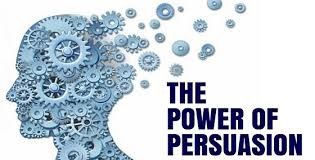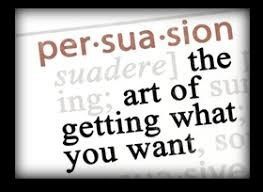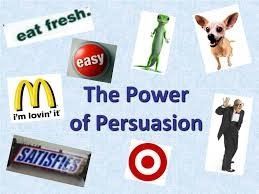The Power of Persuasion: The Most Crucial Skill of the 21st Century

Persuasion is arguably the most essential skill in the 21st century, yet it’s often misunderstood. Many people mistakenly equate persuasion with manipulation, believing that to persuade is to deceive or coerce. However, these are two entirely different concepts. Persuasion is about ethically influencing others, while manipulation often involves deceit and serves the manipulator's interests at the expense of others.
The truth is, we all engage in persuasion daily, often without even realizing it. Whether you're convincing a friend to join you for dinner, presenting a compelling argument at work, or negotiating terms in a business deal, you are persuading. The difference lies in how aware and intentional you are about the process.
The necessity of persuasion is rooted in a fundamental aspect of human nature: the desire to achieve goals and improve one’s life. We all want to secure resources, gain attention, and establish some form of control over our circumstances. To do this, we must persuade others to see value in what we offer, whether it’s a product, a service, or simply our company. In a world where influence is power, those who master the art of persuasion inevitably rise to the top.
Understanding the Role of Power in Persuasion
The most successful people in history, and in today's world, are those who understand and leverage power and influence. They realize that to achieve their goals, they must first gain the resources necessary to pursue them. Power, when used correctly, is not inherently bad. In fact, it's an essential tool for making a positive impact. It becomes problematic only when pursued unconsciously, without regard for the broader consequences of one’s actions.
Consider this: every time you persuade someone to see things your way, you are effectively playing the game of life. You are not only influencing another person’s decision but also shaping your reality. This pursuit of influence is not just about gaining material wealth or status; it’s about creating a life that aligns with your values and aspirations.

The Misconceptions About Power and Influence
Society often paints power and influence in a negative light, associating them with selfishness or corruption. However, this view is narrow and overlooks the potential of power to drive positive change. Everyone possesses some degree of power and influence, whether they realize it or not. The key is to harness these tools consciously and ethically.
The criticism of power often comes from those who are either unaware of their own influence or uncomfortable with the idea of wielding it. These individuals may argue that power games are inherently bad, failing to recognize that their own resistance to power is a power game in itself. It’s a form of self-deception that prevents them from contributing meaningfully to society and achieving their full potential.
Persuasion and the Pursuit of a Meaningful Life
After engaging in numerous conversations with people striving for a fulfilling life, a pattern emerges: they all desire work that brings joy, a lifestyle that holds meaning, and a depth that transcends the superficial content bombarding them daily. However, to attain these things, one must possess a certain level of power and influence.
Society often paints power and influence in a negative light, associating them with selfishness or corruption. However, this view is narrow and overlooks the potential of power to drive positive change. Everyone possesses some degree of power and influence, whether they realize it or not. The key is to harness these tools consciously and ethically.
The Ethical Imperative of Persuasion
It’s easy to fall into the trap of thinking that power and influence are inherently negative. However, when used consciously and with an understanding of the broader impact, persuasion can be a force for good. It’s not about convincing people to do things against their will or best interests; it’s about aligning their desires with your goals in a way that benefits everyone involved.
This approach to persuasion requires a deep understanding of human nature and a commitment to ethical behavior. When you persuade someone, you are guiding them towards a decision or action that you believe will improve their life in some way. If your intentions are genuine and your methods are transparent, then persuasion is not only ethical but also a crucial tool for achieving collective progress.
The Art of Structured Persuasion
Effective persuasion often involves structured thinking. Frameworks and structures are not the enemies of creativity; in fact, they are its best allies. They provide a foundation upon which creativity can flourish. When you understand the principles behind persuasive communication, you can use these structures to craft compelling messages that resonate with your audience.
Let’s take writing as an example. When crafting a persuasive piece, whether it’s a blog post, a social media update, or a sales pitch, starting with a clear framework can make a significant difference. Frameworks help organize your thoughts, ensure that your message is coherent, and make it easier for your audience to follow your reasoning. This doesn’t mean you have to sacrifice authenticity; it means you’re using a proven method to enhance the impact of your communication.
The Pyramid Principle: A Simple Yet Powerful Framework
One of the most effective frameworks for persuasion is the Pyramid Principle. This method involves structuring your communication in a way that starts with the conclusion or main idea, followed by key arguments that support this conclusion, and then backing those arguments with data, anecdotes, or quotes. This structure makes your message clear and compelling, allowing your audience to quickly grasp your point and understand the reasoning behind it.
For example, if you’re writing a blog post about the importance of self-discipline, you would start by stating your main idea: self-discipline is the foundation of success. You would then present three key arguments to support this claim, such as the role of discipline in achieving long-term goals, its impact on mental health, and its importance in maintaining consistency. Finally, you would support these arguments with research findings, personal stories, or expert opinions.
This framework is not just for writing; it can be applied to any form of communication, from public speaking to everyday conversations. By structuring your thoughts in this way, you make it easier for others to understand and agree with your point of view.
Embracing Frameworks for Creativity and Impact
Frameworks like the Pyramid Principle don’t limit your creativity; they enhance it. When you have a clear structure to follow, you can focus your creative energy on developing unique and compelling arguments rather than worrying about how to organize your thoughts. This approach not only makes your communication more effective but also allows you to express yourself more freely and confidently.
The key to mastering persuasion is practice. The more you use these frameworks in your daily life, the more natural they will become. Whether you’re writing a social media post, giving a presentation, or negotiating a deal, start by outlining your main idea, supporting arguments, and evidence. Over time, you’ll find that this structured approach becomes second nature, enabling you to persuade others with ease and confidence.

Know Your Audience: The Foundation of Effective Persuasion
One of the most important aspects of persuasion is understanding your audience. Your words will only be persuasive if they resonate with the people you’re trying to reach. This means tailoring your message to their level of awareness and addressing their specific needs and concerns.
There are five levels of audience awareness:
- Unaware: The audience is unaware of their problem or how it affects their quality of life. Here, you focus on identifying pain points and making them relatable.
- Problem Aware: The audience knows they have a problem but doesn’t know how to solve it. Your task is to highlight the impact of the problem and guide them towards a solution.
- Solution Aware: The audience knows there’s a solution but isn’t sure what it is. At this level, you provide actionable advice and demonstrate the effectiveness of your solution.
- Product Aware: The audience is aware of the solution and is looking for a streamlined path to solve their problem. Your goal is to present your unique approach or product as the best option.
- Most Aware:
The audience is ready to take action but needs a compelling reason to do so. At this stage, you focus on removing any remaining doubts and encouraging them to act.
By understanding where your audience falls on this spectrum, you can tailor your message to meet them where they are, increasing the likelihood of persuasion.
The Power of Stories in Persuasion
Humans are naturally drawn to stories. We use them to make sense of the world, to relate to others, and to process information. When you frame your message as a story, you engage your audience’s emotions and make your message more memorable.
Start your story with a problem or challenge, something that your audience can relate to. This sets the stage for the solution you’re offering and makes your audience more invested in the outcome. As you develop your story, introduce evidence or anecdotes that support your claims, and lead your audience towards a resolution that aligns with your goals.

Becoming a Persuasive Communicator
To become a persuasive communicator, you need to combine the power of structured thinking with a deep understanding of your audience and the ability to tell compelling stories. It’s not just about convincing others to see things your way; it’s about guiding them towards decisions and actions that benefit everyone involved.
Start by practicing these techniques in your daily life. Use frameworks to structure your thoughts, tailor your message to your audience, and use storytelling to make your message more engaging. Over time, you’ll find that your ability to persuade becomes second nature, opening up new opportunities for success and fulfillment.
Remember, persuasion is not about manipulation; it’s about influence. It’s about creating a life that reflects your values and aspirations by ethically guiding others towards a shared vision. Master this skill, and you’ll find that the possibilities are endless.



